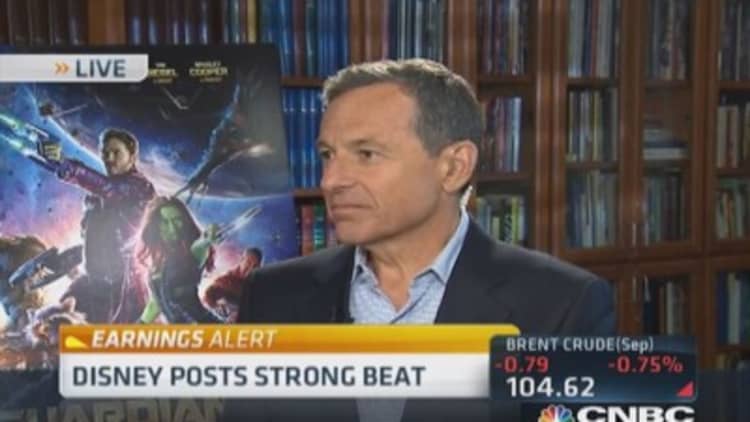Up in the sky! It's a bird! It's a plane! No, it's a billboard for another upcoming superhero movie.
Six years after Marvel Studios launched "Iron Man," comic book heroes are ubiquitous on the big screen. And they're about to get more so, as the last few weeks have seen announcements from two big studios, showing that the trend has no sign of abating.
"For next five years until 2020, we are going to be inundated with it, a huge slate of superhero films unlike we've ever seen before," said Jeff Bock, senior box office analyst at Exhibitor Relations Co.
Audiences show little sign of fatigue since Marvel Studios launched its so-called shared cinematic universe six years ago, analysts said, but the next few years will likely test the endurance of the genre.

Most recently, on Tuesday, Marvel announced nine new films starring its stable of Marvel Comics characters that will be released by 2019.
Read More
Just two weeks prior, Warner Bros. Entertainment released a slate of 10 movies based on DC Comics properties to be release through 2020. 20th Century Fox has multiple "X-Men" sequels and spinoffs in the pipeline and will reboot its "Fantastic Four" franchise. Sony Pictures plans to finish a second "Spider-Man" trilogy by 2018 and release at least one film based on supporting characters in the interim.
Between 2016 and 2018, the four companies will release at least a dozen superhero movies each year. As long as audiences are willing to pay a premium to see the films in theaters, it seems unlikely the juggernaut will stop rolling.
"Until audiences say 'No,' studios are going to say, 'Yes, yes, a hundred times yes,'" Bock said.
Foreigners saving superheroes
Still, there are at least some signs of weakness in U.S. sales growth for superhero movies.
The rebooted "Amazing Spider-Man" and its sequel have earned more than $700 million worldwide and rank among the top 10 grossing superhero movies, according to data from research company Rentrak. But the new adaptations have fallen short of earnings for each of the movies in Sony's original "Spider-Man" trilogy launched in 2002.
Much of the sales growth for superhero flicks is being generated overseas, which tracks with the overall trend for big-budget Hollywood movies. While the first two films in the original "Spider-Man" trilogy earned roughly half of their ticket sales abroad, the first two "Amazing Spider-Man" installments took in more than two-thirds of their haul at foreign theaters.
Read More POW! Superhero films knock 'em dead in China
Similarly, "X-Men: Days of Future Past," earned $233 million at the U.S. box office, just short of the haul for 2006's "X-Men: The Last Stand." But it outperformed all previous "X-Men" films in global sales.
Marvel Studios' magic
Marvel Studios has thus far steadily built momentum. With $1.5 billion in global ticket sales, 2012's "The Avengers" is the best-performing superhero movie of all time and the third highest-grossing movie ever. In 2013, "Iron Man 3" did $1.2 billion worldwide and "Thor: The Dark World" took in $644 million. "Captain America: The Winter Soldier" earned about $700 million this year.
The lineup Marvel Studios announced this week is a mix of sequels featuring proven box office draws and properties little known beyond the realm of comic book fandom. Among the "Captain America," "Avengers" and "Thor" follow-ups are films starring the mystical Doctor Strange and a super-powered race called the Inhumans.
Read More Alibaba in talks with Sony Pictures: Report
Marvel Studios will also release its first movies starring standalone Black and female heroes, the African prince/hero Black Panther and the cosmic guardian Captain Marvel, respectively. Previously, women and non-white actors have been relegated to the roles of sidekicks and ensemble players.
The slate reflects Marvel and Disney's strategy of releasing guaranteed hits with fresh characters that can build out the shared universe, analysts said.
"This is chess. It ain't checkers," said Paul Dergarabedian, senior media analyst at Rentrak. "This is an ongoing strategy to ensure the future of the brand, the longevity of the brand, and to create long-term interest among movie-goers."
Read More Wal-Mart beefs up its used game business
Marvel Studios benefits from positive word of mouth because comic book readers have been happy with its adaptations, said Bock. The same cannot be said for DC films. He noted that 2011's "Green Lantern" was a critical and commercial failure and last year's "Man of Steel" left some Superman fans dissatisfied. Christopher Nolan's self-contained "Batman" trilogy is the exception.
He said Warner Bros. is on the right track with next year's "Batman v Superman: Dawn of Justice" because the studio is giving audiences something they've never seen before: its top two characters united on screen.
Second-string superheroes
Marvel Studios has also defied expectations with its first film based on an obscure property.
"Guardians of the Galaxy" has earned $752 million worldwide, surpassing this year's Captain America and X-Men sequels in worldwide box office sales. It is now the eighth highest-grossing superhero film to date before adjusting for inflation.
"As we saw with 'Guardians of the Galaxy,' even if you don't have a brand that's known, the Marvel brand is enough of a draw," Dergarabedian said.
Read More A Virtual Reality Arcade? Why It Makes Sense, and Why It Might Not Work
Next year, Marvel will see if the solo story of a size-shifting smart aleck called Ant-Man can connect with audiences the way the ensemble cast of "Guardians of the Galaxy" did.
On the surface it may look like a risk, but Bock said introducing individual characters allows Marvel to refresh the lineup of its crown jewel—the Avengers—as stars such as Robert Downey Jr., Chris Evans, and Chris Hemsworth bow out.
"In the past, in the superhero genre, there was always this thought that the supply of content will run out. There's just simply a finite number of characters," said Dergarabedian. "That just has not happened."


